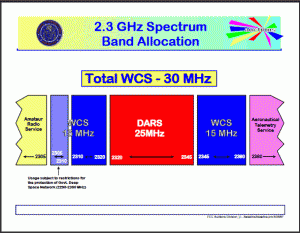
Sirius XM owns the Digital Audio Radio Spectrum ("DARS" in red) right smack dab in the middle of the WCS bands.
The great war between Sirius satellite radio (SIRI) and the Wireless Communications System Coalition has taken another interesting turn as the Federal Communications Commission ponders whether to lift the price caps the FCC imposed on Sirius as a condition for its merger with XM in 2008.
The WCS Coalition—backed by Comcast (CMCSA), Nextwave (WAVE), and other wireless companies has spent years trying to resolve spectrum interference issues with Sirius so it can offer wireless broadband services in two nearby spectrum bands. Now the group says drop the caps if the FCC rejects Sirius requested rules that the wireless coalition thinks will screw up its networks.
“It would be premature for the Commission to lift the price cap that was put in place to protect consumers against unwarranted Sirius XM price increases. Rather, the WCS Coalition respectfully suggests that the Commission retain the existing price cap on an interim basis, and defer any decision to lift or modify the price cap until the Commission can address [Sirius’s] pending petitions for reconsideration. By first assuring that spectrum will be available for the delivery of Internet-based audio services to automobiles and other places where consumers listen to Sirius XM, the Commission will then be able to lift the price cap without fear of anti-consumer impacts.”
Some background on this godforsaken mess, which we have been covering here for some time. For at least half a decade Sirius, XM and companies in the WCS band have been trying to work out a peaceful coexistence non-interference deal. The owners of the WCS spectrum occupy the 2305-2320 and 2345-2360 MHz bands, while Sirius occupies 2320-2345—smack dab in the middle of WCS.
Finally last year the FCC implemented the non-inteference recommendations mentioned in its National Broadband Plan, but Sirius continued to object to them, and filed a petition for reconsideration against the provisions, which the satellite radio company argued were too lax.
But now, as the third anniversary of the Sirius XM merger approaches (July 28), the FCC must consider whether to lift the three year subscriber price caps that it imposed as a condition for the union. Present Sirius subscription prices range from $6.99 for an a la carte package to $19.99 for the Sirius XM “all-in-one” deal. Obviously Sirius wants the option to raise prices, and said so in a recent filing with the Commission, arguing that the Internet has made the radio business robustly competitive, so the caps aren’t needed:
Satellite radio competes for listeners with an expanding array of audio entertainment choices—most of which are available to consumers for free. These choices include terrestrial AM/FM radio, HD radio, iPods and other portable audio devices, and they increasingly include Internet-based services, such as Pandora, Rhapsody, Slacker, Lastfm and iheartradio.
Pandora alone is reportedly available on over 200 devices in addition to the computer. This competition for audio entertainment is especially acute in vehicles, with several automakers introducing features integrating Internet-based services, further reducing any remaining arguable hurdles to the seamless use of smartphones, iPods and other portable audio devices in vehicles.
But WCS pushes back that, yeah, the environment is potentially competitive, but not if the FCC screws up our new wireless broadband services in those bands with the revised non-interference rules that Sirius wants:
“It is ironic that Sirius XM would in this proceeding point to Internet-based services as competitive threats,” the coalition writes, because “Sirius XM continues to advocate a wide range of rules and policies that will severely limit, if not effectively preclude, the offering of broadband services over WCS as envisioned by the National Broadband Plan.” And:
As the Commission considers Sirius XM’s request to be freed from its price cap, it can and should find that Internet-based audio services have the potential to compete with Sirius XM. But the Commission cannot ignore that Internet-based services will only realize that potential if there is sufficient spectrum that is both available and appropriately regulated to meet the exploding demand for mobile broadband.
It never ends. More public comments to the FCC on this issue here.


